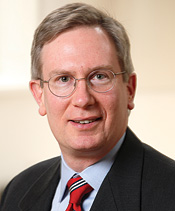Beyond Standard Legal Analysis
 |
Paul G. Mahoney
Political science, like economics, was once principally the province of normative and theoretical analysis based on narrative description, but has in recent decades shifted to positive inquiry based on statistical analysis and mathematical models. This shift is visible to lawyers particularly in writings on Congress and the courts. Political scientists try to explain the behavior of legislators and judges through mathematical modeling of voting driven by preferences over a one-dimensional policy space. They test the resulting predictions against data by attempting to measure the preferences of the decision makers and the outcome of the voting or deliberative process.
Inevitably, legal academics with quantitative training, some of them at Virginia, have followed suit. And, perhaps equally inevitably, judges have paid attention to writings by law professors that suggest that judicial behavior in the aggregate is predictable based on non-legal characteristics.In this issue of the UVA Lawyer, we gather views from our faculty and from alumni on the bench on the topic of judicial decision making. In a Virginia Law Review article in 1997, NYU Professor (and later Dean) Richard Revesz presented empirical evidence on the impact of judges’ ideological preferences on their decisions. He studied a limited subset of cases involving procedural challenges to environmental regulations in a single court, the D.C. Circuit. Unlike politicians, judges do not publicly proclaim their ideological leanings, so one must use an observable proxy. The standard proxy in the political science literature for a judge’s ideology is the party of the President who appointed that judge. Using that proxy, Revesz concluded that a judge’s ideological preferences play a role in his or her votes on a multi-judge panel.
Revesz’s article drew a spirited response from Judge Harry Edwards of the D.C. Circuit, prompting a rebuttal from Revesz. In many ways, the interchange reflects core differences between legal and formal empirical thinking. Limiting the sample to cases raising similar issues in a single court can help a researcher filter out noise and boost the ability to find a relation between variables, but it does raise a question of validity outside the limited scope of the sample. Those questions can be resolved through a combination of theoretical analysis (is there any reason to believe that these cases or judges are so different from others that the results cannot be generalized?) and through further empirical tests on other, dissimilar samples.
But lawyers often respond by dismissing out of hand the notion that we can learn anything by looking at a sample rather than the entire population, and Edwards did so in his critique of Revesz. The notion of using an observable proxy for something that is unobservable also strikes lawyers as absurd. I suspect this is because we as lawyers tend to focus on the outcome of a specific case rather than average tendencies. Empirical tests identify tendencies but can’t tell us what will happen in a specific case, and many lawyers therefore find them useless.
In order to shed light on these and other differences in viewpoint, we interviewed Judges Eugene Siler ’63, LL.M. ’95 of the Sixth Circuit, Boyce Martin ’63, formerly Chief Judge of the Sixth Circuit, Myron Steele ’70, LL.M. ’04, Chief Justice of the Delaware Supreme Court, and Cynthia Kinser ’77, Chief Justice of the Virginia Supreme Court. We also convened a panel of professors whose research involves judicial decision making. Always a leader in interdisciplinary legal research, Virginia’s faculty has contributed significantly to work at the intersections of law and political science and law and psychology.
This issue also contains an interview with Judge J. Harvie Wilkinson III ’72 of the Fourth Circuit, who brings the perspective of a former professor to the bench. He speaks about the latest of his five books and perhaps his most controversial: Cosmic Constitutional Theory: Why Americans are Losing Their Inalienable Right to Self-Governance. The book explores and critiques the use of constitutional theory in judging. In the book and in the interview, Judge Wilkinson presents a learned and impassioned defense of the judge as interpreter of legal texts, not as expositor of comprehensive theories.
We also include an opinion piece by Professor Richard Shell ’81 of the Wharton School of Business at the University of Pennsylvania. It is no secret to our many graduates who have achieved success in business, finance, public service, and other non-legal careers that the analytical training offered at Virginia and other top law schools is extremely, perhaps uniquely, useful in a broad range of callings. An increasing number of law students arrives thinking explicitly about potential career paths that diverge from legal practice. Professor Shell offers his thoughts about how law schools can better serve those students.
Each of these pieces pushes beyond standard legal analysis and practice. I hope you find them informative and enjoyable.




